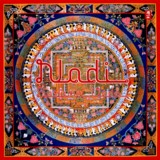|

PMR-0038 |
Nadi / Susumu Ueda
01.
Welcome Rain
|
|
A street corner in India that is fully alive, with all sorts of cars, people and animals coming and going. In the Hindu spiritual world, the figures of Indian people living the lives they have been given makes me think about the essence of living: they really look tough and energetic. I'm listening to this album now, recalling scenes like this.
A new motif for Susumu Ueda, who uses "Asia" as the basis of his creative themes, is "India". Ueda has described places that symbolize Asia, such as the Silk Road in China and the ancient city in Japan, Kyoto, in sounds. The sound creation, that incorporates Buddhist chants and temple bells, is really unique. Why he had wanted to do this for a long time and has chosen India as his theme is probably because the place he has chosen is Chakra in Asia. (The center of life energy.) The album title, "NADI" means "a big river" in Indian. This title was chosen with the holy river Ganges in mind. In the way the word 'Nadi' is used to mean the route that life energy follows as it runs through a body in Yoga, and the Ganges is exactly the passage of life. New lives, blessed to be in this world, are cleansed with the water of the Ganges, and the corpses of those who have completed their short lives are buried in its currentc. Everything is made for metempsychosis here. As well as Ueda describing the figures of living people, he interprets Indian myths, the nature of the south of the country, and the 'smart' streets with his own sensitivity, and turns them into sounds. And there is no local Indian musician among the members of the group that has worked together to create these sounds. Tadahiro Wakabayashi, a leading Japanese musician in the Indian music field, and Takashi Kobayashi, who has played in many sessions with jazz musicians, play the sitar, the stringed instrument that most reminds us of India. HIROS, who studied at Banaras Hindu University, Music Department, majoring in theory, plays the Bansuri (bamboo flute). The oboist, Hiroshi Shibayama, who performs on stringed instruments and also works on modern music, classic instruments and folk instruments, is also featured. This is not "Indian music". It is a piece by a Japanese musician, Susumu Ueda, who has imagined "India". He says, "I create sounds wishing not to lose freshness, this is not a parody and it does not display any superficial sensitivity, in other words, the songs reach to the bottom of people's hearts, remain in their memories and rouse rich images, and listeners can be wrapped in comfortable sounds." Well, why not see how you feel about his music?
Music critic, Takashi Ishitani
|
